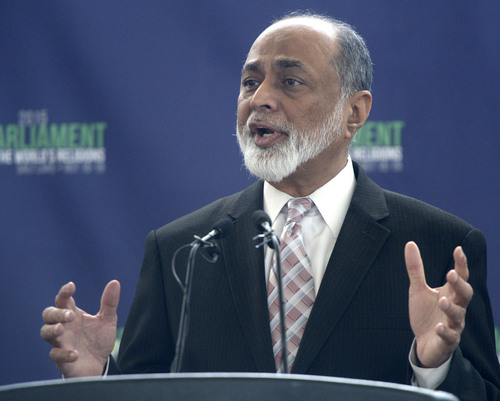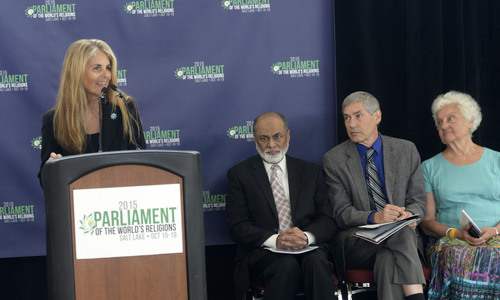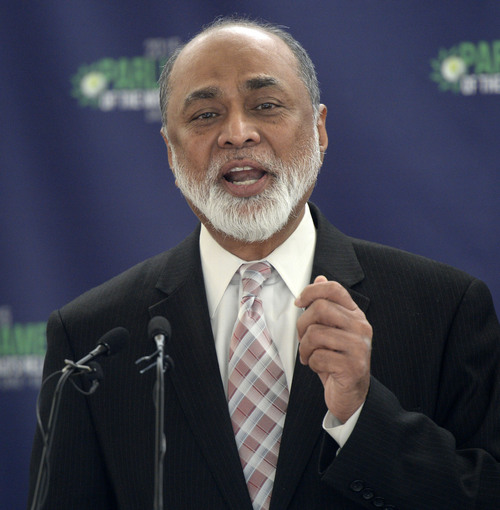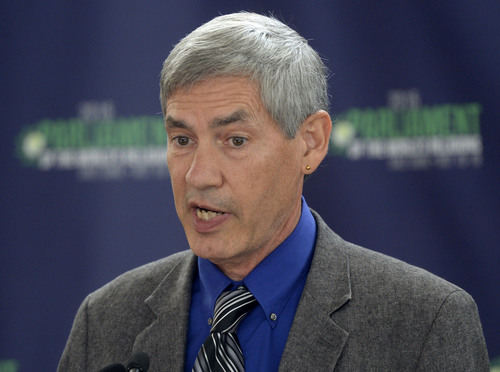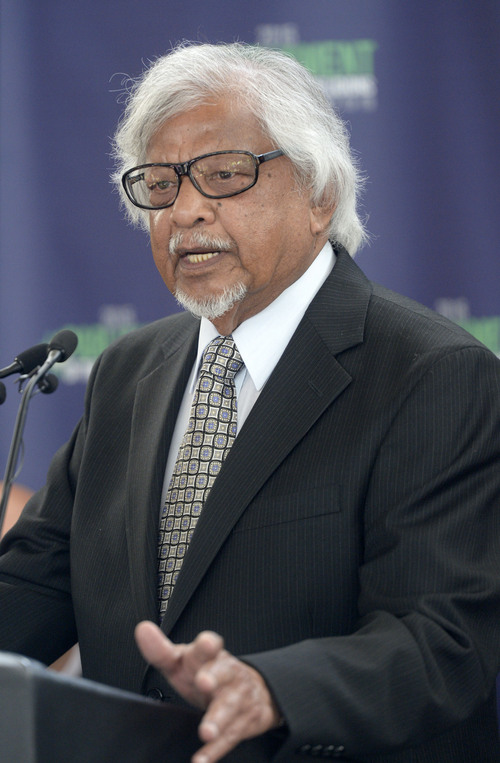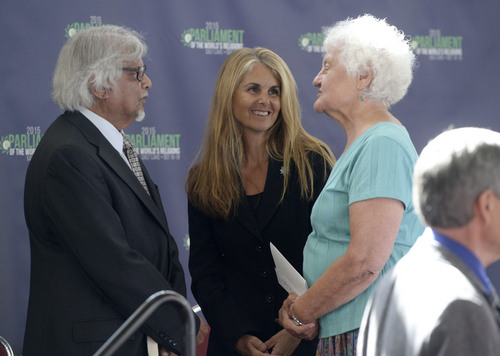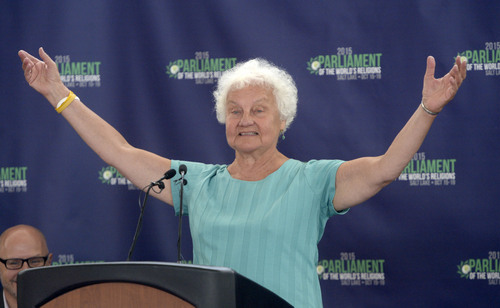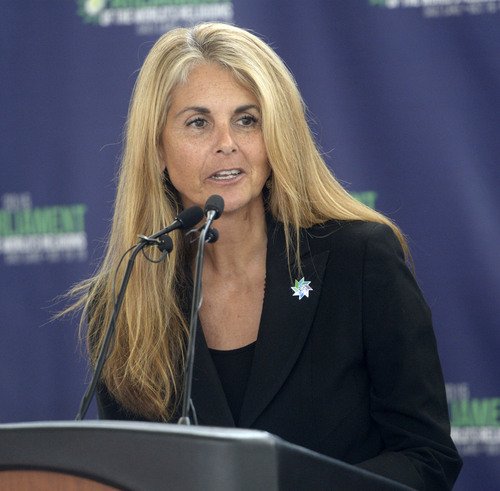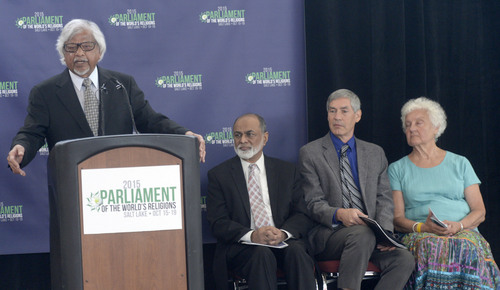This is an archived article that was published on sltrib.com in 2014, and information in the article may be outdated. It is provided only for personal research purposes and may not be reprinted.
The globe's largest and oldest interfaith gathering, Parliament of the World's Religions, is bringing its message of tolerance and engagement to the Beehive State in October 2015 for a historic meeting.
On Tuesday, Parliament representatives announced the upcoming meeting at a news conference, noting that it will be the first time in 22 years the conference will be held in the United States. Previous Parliament cities span the globe from Cape Town, South Africa, to Barcelona, Spain, and Melbourne Australia.
Imam Abdul Malik Mujahid, chairman of the Parliament's board of trustees, explained that Utah's capital, only the second U.S. city ever to host the gathering, was chosen for three reasons: Because it is "a welcoming and hospitable city," it can accommodate large assemblies, and it has an established core of interfaith activists.
The imam specifically noted the work of the Salt Lake Interfaith Roundtable, established in conjunction with the 2002 Winter Olympics, which continues to this day.
The Parliament expects 10,000 or more attendees from 80 countries and 50 faith and spiritual traditions, the imam said.
And, if tradition holds, the gathering may attract Nobel laureates and other luminaries. Previous speakers have included former South African President Nelson Mandela, the Dalai Lama, Archbishop Desmond Tutu, former President Jimmy Carter, Queen Noor of Jordan, anthropologist Jane Goodall, Swami Vivekananda, Rabbi David Saperstein, theology professor Hans Kung, and Amma the Hugging Saint.
The Chicago-based Parliament, an international nonsectarian organization, began in 1893 in conjunction with the World's Fair going on in the Windy City. The Art Institute of Chicago was built originally to house the meeting of more than 3,000 religious representatives.
The global interfaith movement "was born in America," Mujahid said. "It is a pleasure to bring it back here."
Such a broad-minded approach to religion is particularly urgent at this time, said Sande Hart, North American chairwoman of the United Religions Initiative.
The Parliament provides a "safe space, where a sense of wonderment replaces fear and judgment," Hart said. In such a setting, "we are more likely to understand and trust each other."
Arun Gandhi,grandson of Mohandas Gandhi and board president of the Gandhi Worldwide Education Institute, said his grandfather was a religious as well as political revolutionary.
"He saw that there was a lot of misunderstanding among religious people," said Gandhi, who lived with his grandfather during the final two years of the elder statesman's life. "He taught that a friendly study of all scriptures is the sacred duty of every individual."
Thefamed Indian peace activist evolved a prayer service that "incorporated prayers from every religion," Gandhi said. "He was at least 100 years ahead of his time. Maybe 200."
When Parliament participants from many nations flock next year to Utah, headquarters of the 15 million-member Church of Jesus Christ of Latter-day Saints, they may note that this will not be the first time members of that faith are on hand — Mormons were at that inaugural meeting in Chicago.
LDS general authority B.H. Roberts had prepared a paper on Mormonism to be presented, and the governing First Presidency — Wilford Woodruff and his counselors, George Q. Cannon and Joseph F. Smith — attended the daily proceedings, LDS historian Reid L. Neilson wrote in an essay.
In the end, Roberts was not allowed to give his speech to the whole body and refused to give it in a small side room. Still, Neilson concludes, the experience had a profound impact on LDS views of other faiths, particularly Asian.
"Attendance at the Parliament of Religions would radically alter the Mormon mental map of non-Christian religions and their adherents, more than any other 19th-century encounter between Latter-day Saints and Asians," the historian wrote. "At the same time as Latter-day Saints were trying to get other religionists to take a fresh look at post-polygamy Mormonism, they were confronted, along with many of their fellow Christians, with the upstanding morality and shared truths of the religions of Asia."
Such a revision of perceptions is what the interfaith gathering is all about, Parliament officials said Tuesday.
It is a marvelous occasion when people of faith and spirit can come together and work for the common good, said Mary Nelson, the Parliament's executive director. "We are not trying to sing the same song but to sing in harmony."
Twitter: @religiongal


